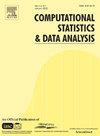A Frisch-Waugh-Lovell theorem for empirical likelihood
IF 1.5
3区 数学
Q3 COMPUTER SCIENCE, INTERDISCIPLINARY APPLICATIONS
引用次数: 0
Abstract
A Frisch-Waugh-Lovell-type (FWL) theorem for empirical likelihood estimation with instrumental variables is presented, which resembles the standard FWL theorem in ordinary least squares (OLS), but its partitioning procedure employs the empirical likelihood weights at the solution rather than the original sample distribution. This result is leveraged to simplify the computational process through an iterative algorithm, where exogenous variables are partitioned out using weighted least squares, and the weights are updated between iterations. Furthermore, it is demonstrated that iterations converge locally to the original empirical likelihood estimate at a stochastically super-linear rate. A feasible iterative constrained optimization algorithm for calculating empirical-likelihood-based confidence intervals is provided, along with a discussion of its properties. Monte Carlo simulations indicate that the iterative algorithm is robust and produces results within the numerical tolerance of the original empirical likelihood estimator in finite samples, while significantly improves computation in large-scale problems. Additionally, the algorithm performs effectively in an illustrative application using the return to education framework.
经验似然的Frisch-Waugh-Lovell定理
提出了一种具有工具变量的经验似然估计的frisch - waugh - lovell型(FWL)定理,它类似于普通最小二乘(OLS)中的标准FWL定理,但其划分过程使用解处的经验似然权重而不是原始样本分布。利用这一结果,通过迭代算法简化计算过程,其中使用加权最小二乘法划分外生变量,并在迭代之间更新权重。进一步证明了迭代以随机超线性速率局部收敛于原始经验似然估计。给出了一种可行的基于经验似然的置信区间迭代约束优化算法,并对其性质进行了讨论。Monte Carlo仿真结果表明,迭代算法具有较强的鲁棒性,在有限样本情况下产生的结果在原始经验似然估计的数值公差范围内,同时在大规模问题中显著提高了计算能力。此外,该算法在使用回归教育框架的说明性应用程序中有效地执行。
本文章由计算机程序翻译,如有差异,请以英文原文为准。
求助全文
约1分钟内获得全文
求助全文
来源期刊

Computational Statistics & Data Analysis
数学-计算机:跨学科应用
CiteScore
3.70
自引率
5.60%
发文量
167
审稿时长
60 days
期刊介绍:
Computational Statistics and Data Analysis (CSDA), an Official Publication of the network Computational and Methodological Statistics (CMStatistics) and of the International Association for Statistical Computing (IASC), is an international journal dedicated to the dissemination of methodological research and applications in the areas of computational statistics and data analysis. The journal consists of four refereed sections which are divided into the following subject areas:
I) Computational Statistics - Manuscripts dealing with: 1) the explicit impact of computers on statistical methodology (e.g., Bayesian computing, bioinformatics,computer graphics, computer intensive inferential methods, data exploration, data mining, expert systems, heuristics, knowledge based systems, machine learning, neural networks, numerical and optimization methods, parallel computing, statistical databases, statistical systems), and 2) the development, evaluation and validation of statistical software and algorithms. Software and algorithms can be submitted with manuscripts and will be stored together with the online article.
II) Statistical Methodology for Data Analysis - Manuscripts dealing with novel and original data analytical strategies and methodologies applied in biostatistics (design and analytic methods for clinical trials, epidemiological studies, statistical genetics, or genetic/environmental interactions), chemometrics, classification, data exploration, density estimation, design of experiments, environmetrics, education, image analysis, marketing, model free data exploration, pattern recognition, psychometrics, statistical physics, image processing, robust procedures.
[...]
III) Special Applications - [...]
IV) Annals of Statistical Data Science [...]
 求助内容:
求助内容: 应助结果提醒方式:
应助结果提醒方式:


